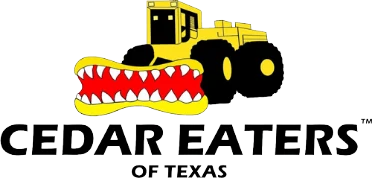The bad news is that we, in the Texas Hill Country, are perpetually in a drought. Water is in short supply, and as populations increase, the water supply will decrease more rapidly.
The good news is that everyone who owns the land has the potential to help increase the water supply.
And no, this isn’t about taking shorter showers or building a water catchment system, although both are excellent ideas! This is about a very simple land restoration method known as cedar mulching.
We’re not sure if you’ve noticed, but Central Texas is literally covered in cedar trees (aka “Ashe Juniper” for the science geeks out there). The problem with cedar trees is that they’re very good at being trees –TOO GOOD. Cedar trees have the tremendous ability to guzzle down upwards of 100 gallons of water per day with their elaborate root systems. As a result, neighboring trees (like oaks) get choked out and can actually die of thirst. Unlike oaks, cedar trees can survive in very dry conditions. They prefer to make their homes in rocky soil like the limestone-rich soil we have in the Texas Hill Country. Their dense canopies are so good at collecting rainwater, that hardly a drop can make it through to the ground.
As a result, native plants (especially grasses) cannot get the water they need from the ground. What’s so important about native grasses? Well, besides holding the soil in place, thereby preventing erosion, they improve the quality of water in our aquifers by filtering rainwater as it moves from the surface of the soil through its roots and into the ground. Not to mention the fact that grass is an important food source for wildlife and cattle.
So, we’ve established that cedar removal increases the water supply and helps native plants and grasses, but it’s important to know that not all cedar removal methods are created equal. At Cedar Eaters of Texas, we strongly believe in the “mulching method.” Mulching cedar trees can help increase water levels even more than other clearing methods. How is that? Well, the layer of cedar mulch left behind seals in moisture and prevents it from being able to evaporate into the atmosphere, leaving all that groundwater in the…well, ground. Much like mulch in your garden bed helps your roses to reach their full potential, so does mulch on your ranch help your hardwood trees.
With the mulching method, quality hardwood trees like oaks can get the water they need to thrive. Native grasses can rebuild their populations. Over time, landowners will even see a rise in the level of their streams and ponds as their watersheds are able to recharge themselves in a natural and healthy way. See? There’s science behind this cedar removal stuff! It really works.
Call us at 1-877-404-8141 or 210-745-2743 to see how you can help increase water levels on your property and recharge the aquifers that everyone needs to live. Read more about Cedar Mulching here.







